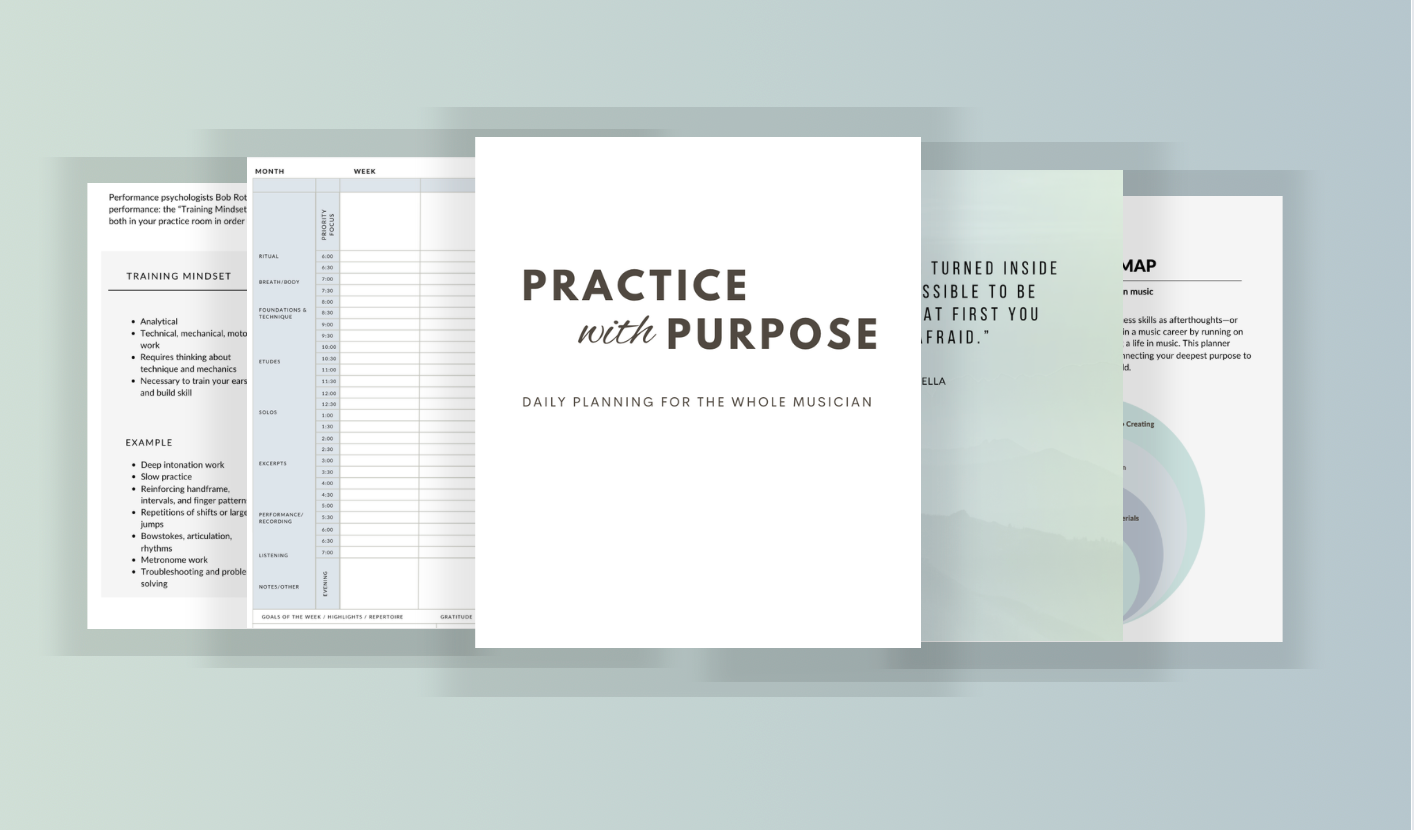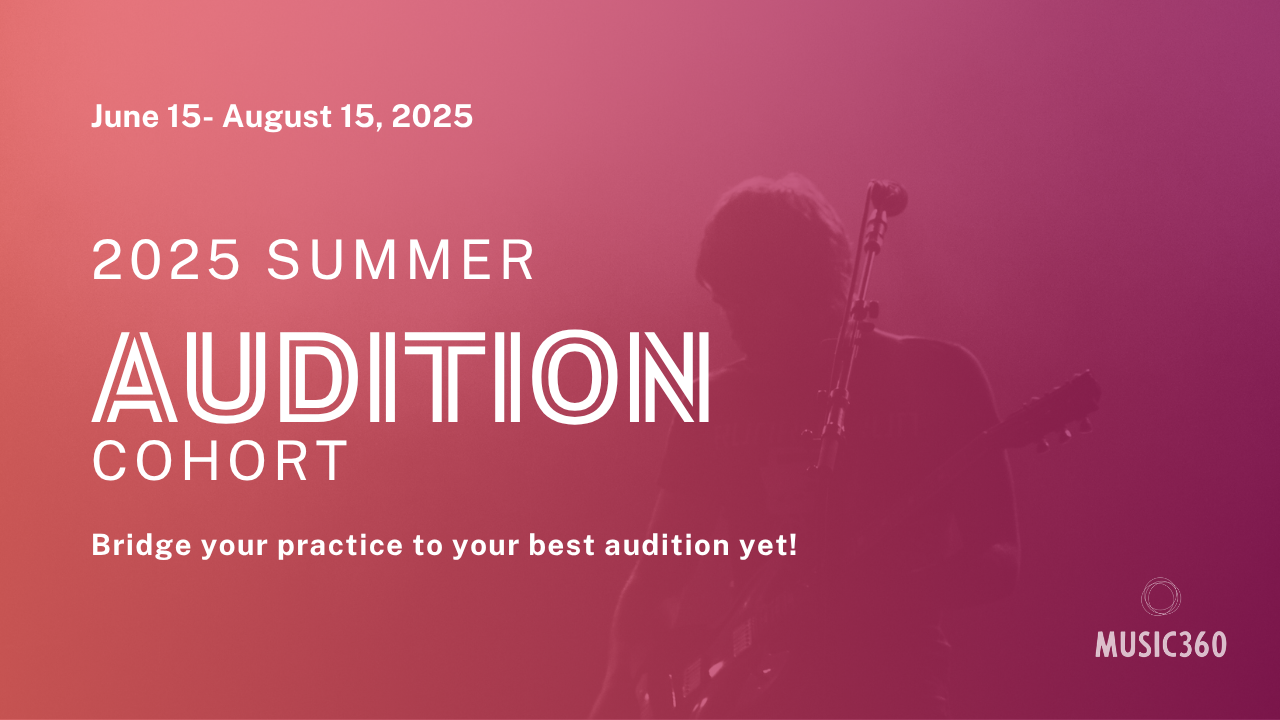Managing the Complete Audition Cycle

After taking an orchestral harp audition a few days ago and many more in recent months and years, the complete audition cycle has been a big part of my existence. Auditions are generally an inevitable, stressful, time consuming part of our careers as musicians. So I spent some time reflecting on what has helped me to bounce back after auditions and frame the overall experience as a positive opportunity for growth and learning! How can we make them more pleasant and less miserable? Through focused, thorough preparation, staying positive and having gratitude for the opportunity to take the audition, using what didn’t go well as an opportunity for growth and learning, and celebrating the little wins along the way!
Well Before the Audition:
Around the same time as deciding that you’re going to take the audition, make sure to track down all of the excerpts on the list. Double (and maybe even triple check) the list to make sure you have all the materials you are going to need and if you don’t have something, ask your mentors and friends if they might have markings you can use to help you get started. It can also sometimes help to start with clean copies of your excerpts, giving you a chance to start fresh without old markings and circles and notes that remind you of past struggles or mistakes you’ve made in the past. Instead, you can use the audition as an opportunity to neatly and precisely mark the part in a way that serves you best!
Once you have the list, divide and conquer. Are there excerpts on the list you feel super comfy with? And then some that are brand new and a little scary? Divide the list into categories so you can know which are going to need a little more attention. Give yourself some extra time to work on the new and scary excerpts and prioritize those early on. Then, rotate through the list so everything gets the well deserved attention it needs. You can also divide the list into excerpts that are really technical or more lyrical and melodic and then switch it up so you aren’t tiring yourself out on just technical excerpts in a day.
An important part of learning the excerpts is a mix of score study and listening to quality recordings. When doing score study, figure out what your role is in the ensemble when playing each excerpt. Are you playing along with someone else and would need to consider blending? Are you the solo line or are you providing accompaniment or are you harmonic support? Or are you just a little bit of decorative color? Allow this information to then shape your interpretation of the excerpt. And when you’re listening to recordings, do your research and try to find recordings of the group or the music director you are auditioning for. And then supplement that list with other well-known orchestras and conductors to provide some variety and comparison. Use the recordings to figure out if there are common practice things that aren’t marked in your part or the score you need to be sensitive of. Use this as a way to show that you really know your stuff when you’re performing in your audition!
Remember that the metronome is your best friend. You can diversify how you use the metronome to keep things interesting. Although practicing with it on every beat can be helpful early on, I tend to zone out after a little while doing this. So, to up the desirable difficulty I’ll practice with it on off beats or on every other beat or even one beat per measure. Or I’ll switch up the rhythmic pattern. For example, if I have a passage with a bunch of 16th notes, I’ll treat them like they’re triplets or quintuplets and then have the metronome click on every third or fifth note respectively. You’ll probably be surprised to find something you thought was really even and steady might not be as rock solid as you thought when you mess around with how you’re using the metronome!
And lastly, be sure that you are still taking care of yourself. Prioritize sleep and rest where you can get it. Eat healthy. Move your body. Take breaks and know when to stop practicing for the day. Reflect on what is going well. Do things that do not involve practicing or thinking about the audition for some balance. Check in with your mental health. While auditions are important, they shouldn’t be the end all, be all at every second of your day. You are more than just someone taking an audition!
Day of the Audition:
Before you head over to the hall, be sure to try and eat something. If you’re anything like me, you might not be particularly hungry from the nerves, but still try to eat something healthy that will stick with you before you have to play. And then take snacks just in case the audition is running behind or you suddenly are feeling hungry. Don’t want to get distracted by a rumbly tummy!
In the warm-up room, do what you have to do to be prepared on stage and nothing more. This is not the time to be shedding your excerpts or stress practicing or showing off how fast you can play something. Do your regular, gentle warm-up routine to get comfortable. Then spot check your excerpts and maybe try starting everything. But don’t overdo it. You don’t want your best performance of the day to happen before the panel can even hear you!
And take some time to breathe and center yourself. Auditions can bring up those panicky, extra anxious feelings for a lot of us, so taking a moment to center and check-in with your breathing can really help. And allowing yourself to feel grounded can sometimes help bring that anxiety back down to a more manageable level.
During the Audition:
As you’re walking out on stage, take a moment to have some gratitude for the moment and take in your surroundings. How cool is it that you’re getting to perform on the same stage as the really great ensemble you’re auditioning for?! Give yourself that moment to breathe and put gratitude out there for the opportunity to perform in a beautiful space. Fill yourself with positivity and thankfulness in the moment.
Then, before you play a note, make sure you feel comfortable. Adjust the stand to the right height and angle, fix the chair or bench, and just make sure you feel as comfy as you can. The last thing you want is to be distracted from feeling too close to your instrument or like you can’t read your music because it is too far away from you.
While you’re playing the audition, be sure to take time between excerpts. Remember the panel has to find the next excerpt and write down any thoughts they may have between excerpts, so they’re probably not in much of a rush. So take that time to reset and to let go of any mistakes that happened. Give yourself a moment to breathe and visualize how you want to perform the next excerpt. If you have a water bottle with you, maybe take a quick sip of water. And then be dazzling!
After the Audition:
After the audition last week, I was talking to my waitress at a restaurant about what I did. I finally found a way of articulating something that has really helped me post-audition and that is “Rejection and failure is an inevitable part of taking auditions. So I am going to celebrate my small wins along the way. Because if I didn’t, I would just be down and miserable all the time and I don’t want that to be my life.”
Auditioning for professional ensemble jobs will often lead to one person winning a job or a few people getting trials and a lot of other people disappointed and down about not getting to the next stage. And it can be easy to fall into the trap of allowing that to define you as a “failure” or “not good enough.” Or to fall into the trap of coming up with conspiracy theories that the panel already had someone in mind so why did you even bother taking the audition in the first place. But negativity breeds negativity. And there is enough of that in the world already, we don’t need the music world to have any more of that.
Instead, focus on your little wins like:
-
Were you happy with how you played or did you feel like it was the best representation of your playing right then and there?
-
Did an excerpt that you have struggled with go really well?
-
Did you feel like you were expressing what you wanted to musically?
-
Did you feel confident and comfortable on stage when you were auditioning?
-
Did you advance to semis or finals?
Use what didn’t go well as an opportunity for growth and learning for the next audition you take:
-
What caught you off guard in the audition?
-
What excerpts didn’t go as well as you would have liked?
-
Were there circumstances within your control that could have helped you to play better?
-
What surprised you about how you felt, physically or mentally?
-
Did you struggle with staying in the moment?
-
How can these things be prepared better for performance next time you audition?
Then, take the time to process how you feel, but don’t stay down on yourself for too long if you didn’t win the job. You are more than your failures and you are more than just your instrument.
Looking for more ways to develop your audition preparedness toolkit? Check out the The Audition Lab on our website for a digital course with Ralph Skiano, principal clarinetist of the Detroit Symphony Orchestra!
written by: Anna Dunlap


